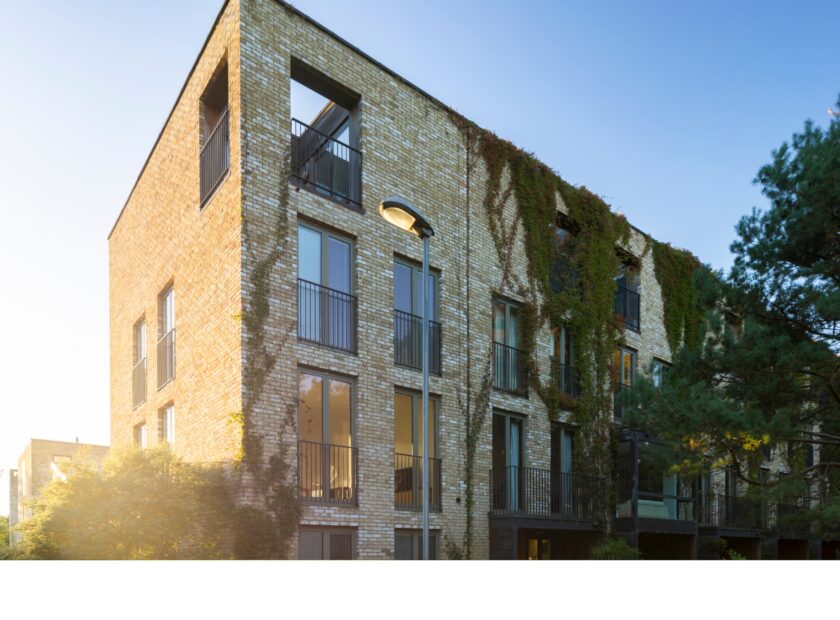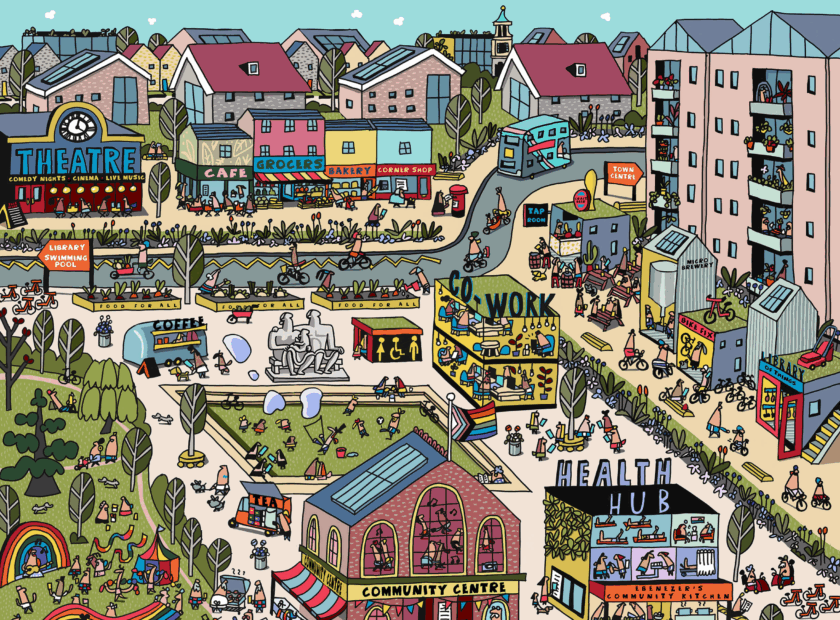What does the term ‘Garden City’ mean to you? For many people, the term Garden City simply means a housing development with tree-lined streets and nice homes with gardens; or sprawling, car-dominated suburbia. Nothing could be further from the truth. The Garden City is a radical but practical approach to creating and renewing places which enable people, and the wider natural environment, to thrive.
Over a century of misuse of the term makes this confusion understandable but is blinding us to a far more impressive and urgent reality: that the Garden City idea is one of the strongest tools we have available to enable a healthy, affordable and zero-carbon future. As part of the Tomorrow:125 project, we’ve created a myth-buster to address some of that confusion head-on.
2023 marks the 125th anniversary of the book which coined the phrase and set in motion a century of TCPA campaigns for healthy and socially-just places. In Tomorrow: A peaceful path to real reform (1898), Ebenezer Howard launched the idea of the Garden City. Howard’s proposition was a means of creating living conditions in which everyone can thrive, so helping to secure the ‘good life’. It was a uniquely practical vision based on sharing the wealth created by developing places.
It has proved to be one of the most influential and enduring examples of an alternative and sustainable way of living that the UK has ever produced. But in recent years the term ‘Garden City’ has been much abused and devalued. Howard’s hopeful ideas are rarely holistically applied, and despite political interest, are often invisible to the communities that need change the most.
The TCPA’s ‘Tomorrow:125’ project has been exploring the roots of this idea. This has involved understanding what Ebenezer Howard’s real aspirations were, as well as exploring how to overcome the misconceptions that have grown around the term Garden City. This required us to separate the current use of the Garden City idea and Garden City Principles as referred to in policy and practice, from the wider ambition for social change.
The TCPA’s recent campaigns have focused on the former – how to use the Garden City model to tackle our current housing crisis and improve the quality and inclusivity of places being delivered. It is now over ten years since the English National Planning Policy Framework was published with reference to the Garden City Principles. While successive Governments have so far avoided implementing a comprehensive programme of new Garden Cities, there has been significant interest in the role of the Garden City Principles and Garden City ‘inspired’ developments.
Today over 50 developments have adopted terms relating to the Garden City Principles in their developments, including through government’s ‘Garden Communities’ programme. And reference to the Principles has been adopted in over 24 Local Plans. This is a positive step for ambitious councils and developers and will likely lead to some improvements in the way places are designed and delivered. However, this interest has so far failed to result in a holistic realisation of the Garden City idea. In some instances, it has led to the creation of places that are a world away from the Garden City model outlined in Ebenezer Howard’s book, but which nevertheless carry its name.
When the debate about meeting our housing needs often becomes very polarised, this contributes to many of the misconceptions about how new communities might help in tackling the housing crisis.
Tomorrow:125 has also allowed us to think beyond the constraints of our current development model. We know the last century’s policy approaches have, in combination, failed to make decent, affordable homes that make healthy lifestyles universally available to all. The climate emergency will radically affect the way we create and plan places. Tomorrow:125 has allowed us to imagine what might be possible if we did things differently. Our interim report outlined the Foundational Principles that are at the heart of the Garden City idea: those based on human thriving, regenerative democracy, and a mutualised local economy.
There are many other organisations and individuals – from academics to community organisers – whose daily mission relates to these principles. Tomorrow:125 is a collaborative project and in the last year we have drawn on input and expertise from those who spend their days on these specific topics, testing and refining the ideas. In doing so, we have found pockets of the Garden City idea alive and well throughout the UK and beyond. From Community Land Trusts to food co-operatives; people are attempting to implement meaningful change in challenging circumstances.
The TCPA has been acting as a curator of learning from these practical examples and academic propositions; understanding which of these ideas and propositions are theoretically coherent, practically viable and evidence based. Also, the extent to which they are politically compelling.
The outcome is a proposition for a development model based on the Foundational Principles of the Garden City idea. This means a housing delivery model which puts social and environmental justice at its heart. It means communities having a direct role in local decision making, enabled by a nurturing local and national government. It means evolving our local economies so that those parts of the economy which make thriving possible, are organised not to extract but to share wealth more effectively, so that the economy meets the needs basic needs of everyone in a more effective and equal way.
Throughout 2023 we’ll be sharing what this looks like and how to get involved in refining and implementing it. The project is pointless if it doesn’t demonstrate the possibility for practical change, so we’ll be exploring what these ideas mean for the creation of new communities and the renewal of existing places, and what policy and legislative changes are required to make it happen. We’ll also be exploring what this means for the future of the planners and other practitioners that are integral to making this vision a reality.
In 2023 the Garden City idea simply means practical hope. Many will dismiss the ideas explored through Tomorrow:125 as Utopian. Our objective is to harness that ambition but demonstrate how to make it happen through practical means, and if there are better ideas out there, we’d love to hear about them! Join us for a year of celebration, debate, and practical action.
‘…the vastness of the task which seems to frighten some of my friends, represents, in fact, the very measure of its value to the community, if that task be only undertaken in a worthy spirit and with worthy aims.’
Tomorrow: A Peaceful Path to Real Reform, p.151




